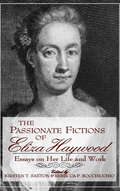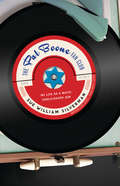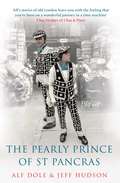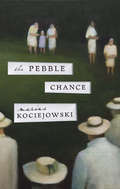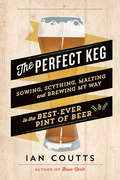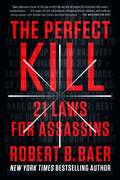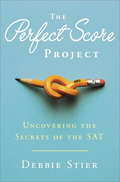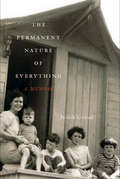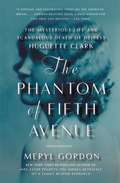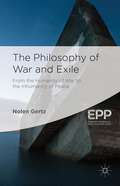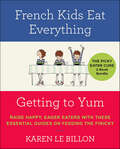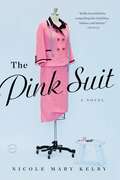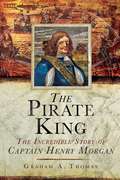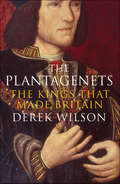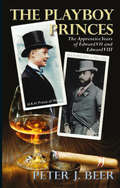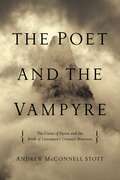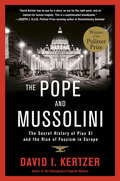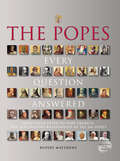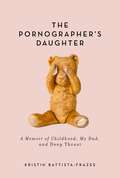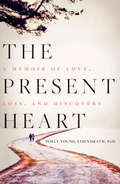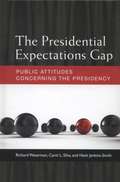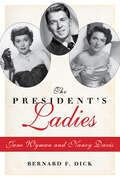- Table View
- List View
The Passionate Fictions of Eliza Haywood: Essays on Her Life and Work
by Kirsten T. Saxton Rebecca P. Bocchicchio“Will be required reading not just for students of eighteenth-century literature but also for feminist critics and historians of the novel.” —Sandra M. Gilbert, award-winning poet and literary criticThe most prolific woman writer of the eighteenth century, Eliza Haywood (1693–1756?) was a key player in the history of the English novel. Along with her contemporary Defoe, she did more than any other writer to create a market for fiction prior to the emergence of Richardson, Fielding, and Smollett.Also one of Augustan England’s most popular authors, Haywood came to fame in 1719 with the publication of her first novel, Love in Excess. In addition to writing fiction, she was a playwright, translator, bookseller, actress, theater critic, and editor of The Female Spectator, the first English periodical written by women for women. Though tremendously popular, her novels and plays from the 1720s and 30s scandalized the reading public with explicit portrayals of female sexuality and led others to call her “the Great Arbitress of Passion.”Essays in this collection explore themes such as the connections between Haywood’s early and late work, her experiments with the form of the novel, her involvement in party politics, her use of myth and plot devices, and her intense interest in the imbalance of power between men and women. Distinguished scholars such as Paula Backschieder, Felicity Nussbaum, and John Richetti approach Haywood from a number of theoretical and topical positions, leading the way in a crucial reexamination of her work. The Passionate Fictions of Eliza Haywood examines the formal and ideological complexities of her prose and demonstrates how Haywood’s texts defy traditional schematization.
The Pat Boone Fan Club: My Life as a White Anglo-Saxon Jew (American Lives)
by Sue William SilvermanGentile reader, and you, Jews, come too. Follow Sue William Silverman, a one-woman cultural mash-up, on her exploration of identity among the mishmash of American idols and ideals that confuse most of us—or should. Pat Boone is our first stop. Now a Tea Party darling, Boone once shone as a squeaky-clean pop music icon of normality, an antidote for Silverman’s own confusing and dangerous home, where being a Jew in a Christian school wasn’t easy, and being the daughter of the Anti-Boone was unspeakable. And yet somehow Silverman found her way, a “gefilte fish swimming upstream,” and found her voice, which in this searching, bracing, hilarious, and moving book tries to make sense of that most troubling American condition: belonging, but to what?Picking apricots on a kibbutz, tramping cross-country in a loathed Volkswagen camper, appearing in a made-for-television version of her own life: Silverman is a bobby-soxer, a baby boomer, a hippy, a lefty, and a rebel with something to say to those of us—most of us—still wondering what to make of ourselves.
The Pearly Prince of St Pancras
by Alf Dole Jeff HudsonPearly Kings and Queens are one of the quintessential icons of 'old London', originally invented to imitate and parody wealthy West End society but also to raise money for charities and good causes. Alf Dole lived his life in this tradition and was the grandson of the very first Pearly King of St Pancras. Born in 1930, Alf grew up in a close-knit family of costermongers - fruit and veg sellers - and his heartwarming memoir recounts London life in the city in a time of horses and trams, pubs where sing-alongs around the piano happened every weekend and summers were spent hop-picking in Kent. When war came along, Alf was evacuated to Wales, where he continued to wear his pearly suit and entertained the locals by playing the spoons. After the war he continued to sell fruit and veg, working in Chapel market. He also had his own sea food stalls outside public houses. Capturing the camaraderie of working in London's street markets in the middle of the 20th century and surviving the Second World War, Alf's memoir also serves as an important slice of social history from a time when working-class communities were proud to celebrate their traditions. Sadly Alf died just after completing his story but his daughter Diane, herself a Pearly Princess, is continuing the family custom in fine tradition.
The Pebble Chance
by Marius Kociejowski"Here the charm is deep, the splendour unlaboured; the colours of history, reckoned afresh, saturate singular people, in whom passion is lucid again...here is one who collects his extraordinary resources, and strides."-Christopher MiddletonIn the game of bocce, no matter how intensely you study the world's surface, there is always a chance an unseen pebble will knock your ball in an unexpected direction. In these essays, poet, antiquarian bookseller, and celebrated travel writer Marius Kociejowski chronicles serendipitous encounters with authors, manuscripts, and eccentrics, in which "the curious workings of fate" and "art's unbidden swerve" intervene to shift the course of fortune.Carried by keen wit, aphoristic prose, and a rich sense of characterization, and featuring chance meetings and comic misadventures with such figures as Bruce Chatwin, Zbigniew Herbert, and Javier Marías, The Pebble Chance is a sumptuous offering of belles lettres exploring the incandescent moments when skill and providence collide."It is a testament to the power of this superb book that I felt not despondency, but ... elation."-Adam Thorpe, The Times Literary Supplement"Treasures are revealed ... with a formidable erudition, and at their best they gleam with an enameled splendour."-Ken Babstock, The Globe and Mail"Kociejowski writes beautifully ... unusual, poetic, and thought-provoking."-Library Journal
The Perfect Keg
by Ian CouttsThe perfect keg. Filled with perfect beer. A symphony of flavors in the mouth. The right blend of sweet and bitter. The fluid in that keg represents a year's work. Actually brewing it took a few weeks. But to make it truly the perfect keg, Ian Coutts had to go right back to fundamentals. This beer didn't start with a beer-making kit, which is what most homebrewers use. And it didn't rely on pre-roasted industrial malt, which is how commercial brewers big and small do it. Coutts made his own malt, aerating wet barley with an aquarium bubbler and blasting it with a hair dryer. Of course, to do that he needed barley. So he grew his own. Hops, too. Yeast, he went out and captured. And that's it. With this beer, the only additives are knowledge and history. There were plenty of adventures, misadventures, and missteps along the way, but Ian writes about them with humor and aplomb, including his own recipes and those of people he worked with in the brewing process, proving it's possible to make the perfect keg of wholly natural beer in one year.
The Perfect Kill
by Robert B. BaerWhat is the definition of assassination? Robert B. Baer's boss at the CIA once told him, "It's a bullet with a man's name on it." Sometimes assassination is the senseless act of a psychotic, a bloodletting without social value. Other times, it can be the sanest and most humane way to change the course of conflict--one bullet, one death, case closed. Assassination has been dramatized by literature and politicized by infamous murders throughout history, and for Robert Baer, one of the most accomplished agents to ever work for the CIA, it's a source of endless fascination, speculation, and intrigue. Over several decades, Baer served as an operative, from Iraq to New Delhi and beyond; notably, his career was the model for the acclaimed movie Syriana. In The Perfect Kill, he takes us on a serpentine adventure through the history of political murder; its connections to, and differences from, the ubiquitous use of drones in state-sponsored killing; his firsthand experience with political executions; and his decades-long cat-and-mouse hunt, across the Middle East and Europe, for the most effective and deadliest assassin of the modern age. A true maverick with an undeniably captivating personal story, Baer pulls back the curtain on the underbelly of world politics and the quiet murderers who operate on the fringe of our society.
The Perfect Score Project
by Debbie StierThe Perfect Score Project is an indispensable guide to acing the SAT - as well as the affecting story of a single mom's quest to light a fire under her teenage son. It all began as an attempt by Debbie Stier to help her high-school age son, Ethan, who would shortly be studying for the SAT. Aware that Ethan was a typical teenager (i.e., completely uninterested in any test) and that a mind-boggling menu of test-prep options existed, she decided - on his behalf -- to sample as many as she could to create the perfect SAT test-prep recipe. Debbie's quest turned out to be an exercise in both hilarity and heartbreak as she took the SAT seven times in one year and in-between "went to school" on standardized testing. Here, she reveals why the SAT has become so important, the cottage industries it has spawned, what really works in preparing for the test and what is a waste of time. Both a toolbox of fresh tips and an amusing snapshot of parental love and wisdom colliding with teenage apathy, The Perfect Score Project rivets. In the book Debbie does it all: wrestles with Kaplan and Princeton Review, enrolls in Kumon, navigates khanacademy.org, meets regularly with a premier grammar coach, takes a battery of intelligence tests, and even cadges free lessons from the world's most prestigious (and expensive) test prep company. Along the way she answers the questions that plague every test-prep rookie, including: "When do I start?"..."Do the brand-name test prep services really deliver?"..."Which should I go with: a tutor, an SAT class, or self study?"..."Does test location really matter?" ... "How do I find the right tutor?"... "How do SAT scores affect merit aid?"... and "What's the one thing I need to know?" The Perfect Score Project's combination of charm, authority, and unexpected poignancy makes it one of the most compulsively readable guides to SAT test prep ever - and a book that will make you think hard about what really matters.From the Hardcover edition.
The Perils of Normalcy: George L. Mosse and the Remaking of Cultural History
by Karel PlessiniA taboo-breaker and a great provocateur, George L. Mosse (1918-99) was one of the great historians of the twentieth century, forging a new historiography of culture that included brilliant insights about the roles of nationalism, fascism, racism, and sexuality. Jewish, gay, and a member of a culturally elite family in Germany, Mosse came of age as the Nazis came to power, before escaping as a teenager to England and America. Mosse was innovative and interdisciplinary as a scholar, and he shattered in his groundbreaking books prevalent assumptions about the nature of National Socialism and the Holocaust. He audaciously drew a link from bourgeois respectability and the ideology of the Enlightenment--the very core of modern Western civilization--to the extermination of the European Jews. <P> In this intellectual biography of George Mosse, Karel Plessini draws on all of Mosse's published and unpublished work to illuminate the origins and development of his groundbreaking methods of historical analysis and the close link between his life and work. He redefined the understanding of modern mass society and politics, masterfully revealing the powerful influence of conformity and political liturgies on twentieth-century history. Mosse warned against the dangers inherent in acquiescence, showing how identity creation and ideological fervor can climax in intolerance and mass murder--a message of continuing relevance.
The Permanent Nature of Everything
by Judith CowanAt five and six years old, lying in the long grass and wildflowers near her family's house on the outskirts of 1940s Toronto, Judith Cowan was certain that what she experienced was the permanent nature of everything. Little by little, she comes to recognize threats: a leering neighbour asking strange questions about her gender, a lady who has died of an illness not revealed, the smell of something dead in the ditch. Her disapproving, resourceful, and frustrated mother, born to Methodist missionaries in China, tells frightening tales: how a pig will kill and eat a little girl, or how she herself as a small child was shot at by pirates on the Yangtze. Sharing memories from the nineteenth century, her grandparents recount their youthful follies, and she realizes that all of us are swept along in time's passing stream. But books seem permanent, and give access to a world of pleasure even if, because of her red hair, the boys torment her on the road to school, and she has to fight. A meticulous memoir of growing up in a Canada scarcely aware of itself as a country, The Permanent Nature of Everything rescues recollections from a vanished time and traces the emerging awareness in the emotional world of a child.
The Permanent Nature of Everything: A Memoir
by Judith CowanAt five and six years old, lying in the long grass and wildflowers near her family's house on the outskirts of 1940s Toronto, Judith Cowan was certain that what she experienced was the permanent nature of everything. Little by little, she comes to recognize threats: a leering neighbour asking strange questions about her gender, a lady who has died of an illness not revealed, the smell of something dead in the ditch. Her disapproving, resourceful, and frustrated mother, born to Methodist missionaries in China, tells frightening tales: how a pig will kill and eat a little girl, or how she herself as a small child was shot at by pirates on the Yangtze. Sharing memories from the nineteenth century, her grandparents recount their youthful follies, and she realizes that all of us are swept along in time's passing stream. But books seem permanent, and give access to a world of pleasure even if, because of her red hair, the boys torment her on the road to school, and she has to fight. A meticulous memoir of growing up in a Canada scarcely aware of itself as a country, The Permanent Nature of Everything rescues recollections from a vanished time and traces the emerging awareness in the emotional world of a child.
The Phantom of Fifth Avenue: The Mysterious Life and Scandalous Death of Heiress Huguette Clark
by Meryl GordonWhen Huguette Clark died in the spring of 2011, the 104-year-old heiress left behind a 42-room apartment on New York's Fifth Avenue, a 23-acre estate overlooking the Pacific Ocean in Santa Barbara, a fortune estimated at $300 million and countless unanswered questions including why did she spend the last twenty years of her life hiding out in hospitals and collecting antique French porcelain dolls?Born in 1906, Huguette grew up in her family's 121-room Beaux Arts mansion in Manhattan and was one of the leading celebrities of her day. Her father William Andrews Clark, was a copper magnate, the second richest man in American, and not above bribing his way into the Senate. Huguette attended the coronation of King George V. And at twenty-two with a personal fortune of $50 million to her name, she married a Princeton man and childhood friend William MacDonald Gower. Two-years later the couple divorced. After a series of failed romances, Huguette began to withdraw from society--first living a few floors above her mother at 907 Fifth Avenue and after her mother's passing by herself in a vast apartment overlooking Central Park, eating crackers and watching The Flintstones with only hired help for company. Thanks to exclusive interviews with numerous members of Huguette Clark's inner circle, newly-discovered love letters, and archival material removed from her apartment, author Meryl Gordon finally solves the mystery of what turned a Jazz Age socialite into an Internet Era recluse. And what was her life like inside that gilded, copper cage?
The Philosophy of War and Exile
by Nolen GertzArguing that the suffering of combatants is better understood through philosophy than psychology, as not trauma, but exile, this book investigates the experiences of torturers, UAV operators, cyberwarriors, and veterans to reveal not only the exile at the core of becoming a combatant, but the evasion from exile at the core of being a noncombatant.
The Picky Eater Cure 2-Book Bundle: French Kids Eat Everything and Getting to YUM
by Karen Le BillonThe Picky Eater Cure 2 Book Bundle by Karen Le Billon contains two of her popular books, French Kids Eat Everything: How Our Family Moved to France, Cured Picky Eating, Banned Snacking, and Discovered 10 Simple Rules for Raising Happy, Healthy Eaters and Getting to YUM: The 7 Secrets of Raising Eager Eaters. In this practical and engaging two-book collection, Karen Le Billon provides a how-to guide for parents to feed their children without endless battles and struggles with pickiness, and also reveals revolutionary new research on the science of taste. Kids don't learn to love healthy food by accident. Teach your kids to eat, just as you teach them to read!
The Pink Suit: A Novel
by Nicole KelbyA novel based on the true story behind Jacqueline Kennedy's iconic pink suit. On November 22, 1963, the First Lady accompanied her husband to Dallas, Texas dressed in a pink Chanel-style suit that was his favorite. Much of her wardrobe, including the pink suit, came from the New York boutique Chez Ninon where a young seamstress, an Irish immigrant named Kate, worked behind the scenes to meticulously craft the memorable outfits. While the two never met, Kate knew every tuck and pleat needed to create the illusion of the First Lady's perfection. And when the pink suit becomes infamous, Kate's already fragile world--divided between the excess and artistry of Chez Ninon and the traditional values of her insular neighborhood--threatens to rip apart.The Pink Suit is a fascinating look at politics, fashion, and some of the most glamorous women in history, seen through the eyes of a young woman caught in the midst of an American breed of upstairs/downstairs class drama.
The Pirate King: The Incredible Story of the Real Captain Morgan
by Graham A. ThomasA compelling account of history's most famous pirate. The Pirate King is the compelling true story of a Welshman who became one of the most ruthless and brutal buccaneers of the golden age of piracy. The inspiration for dozens of fictionalized pirates in film, television, and literature--as well the namesake of one of the world’s most popular rum brands--Captain Sir Henry Morgan was matchless among pirates and privateers. Unlike most of his contemporaries, he was not hunted down and killed or captured by the authorities. Instead he was considered a hero in England and given a knighthood and eventually was made governor of Jamaica. As Graham Thomas reveals in this fresh biography of this complex and intriguing character, Morgan was an exceptional military leader whose prime motivation was to amass as much wealth as he could by sacking and plundering settlements, towns, and cities up and down the Spanish Main. Featuring graphic accounts of Morgan’s exploits, eventually leading to an unparalleled rise to power and legitimacy, The Pirate King is a riveting read sure to become a key text in pirate literature. Thomas dispels myths and separates fact from fiction as he presents an intriguing new portrait of one of history’s most compelling figures. Skyhorse Publishing, as well as our Arcade imprint, are proud to publish a broad range of books for readers interested in history--books about World War II, the Third Reich, Hitler and his henchmen, the JFK assassination, conspiracies, the American Civil War, the American Revolution, gladiators, Vikings, ancient Rome, medieval times, the old West, and much more. While not every title we publish becomes a New York Times bestseller or a national bestseller, we are committed to books on subjects that are sometimes overlooked and to authors whose work might not otherwise find a home.
The Plantagenets: The Kings That Made Britain
by Derek WilsonPlantagenet is the name given to the English royal house descended from the union of Queen Matilda of England and her second husband Geoffrey of Anjou. The name derived from Geoffrey's nickname, which came from the sprig of broom (planta genet) which he wore in his hat. The Plantagenets ruled England for more than three hundred years, from the accession of reign of the dynasty's founder, Matilda and Geoffrey's son, Henry II, in 1154, to the death of the last Plantagenet, Richard III, at the Battle of Bosworth in 1485. The Plantagenets: The Kings That Made Britain is a compelling, year-by-year chronology of a tumultuous and critical period in the development of the English nation. Each year is covered by a concise, informative and accessible narrative, amplified by extensive quotation from contemporary sources and accompanied by generously captioned and stunning images of the period-including illuminations, portraits, maps, royal seals, tapestries and other artifacts. Authoritative, informative and sumptuous, and compiled by a scholar who is steeped in knowledge of the period, The Plantagenets: The Kings That Made Britain brings a critical era of English history dramatically and vividly to life. It is the perfect gift book for anyone with a love of, or fascination for, medieval English history.
The Playboy Princes: The Apprentice Years of Edward VII and VIII
by Peter BeerA fascinating dual biography proves that controversial Royal Family members are not necessarily only a feature of late 20th- or 21st-century lifeEdward VII (1841-1910) and his grandson Edward VIII (1894-1972) were born in different eras, but it is illuminating to compare the early and middle years of the two Princes of Wales as kings in waiting and discover how their youth informed their years on the British throne. The privileges of rank aside, they were heirs to an unenviable role, and this study presents a unique portrait of strained apprenticeships for which there was no satisfactory precedent. Theirs was an upbringing dictated by dogmatic prescription and the heavy weight of obligation. As they pursued their lives according to their distinct personalities, they were never relieved of parental strictures, especially with regard to Queen Victoria and her eldest son, who filled the void with shallow interests, a profligate style of living, and the delights of Parisian nightlife. Inevitably the two princes were consigned to filling much of their time with insubstantial engagements not best suited to their characters and which reveal a common vulnerability. In the case of the future Edward VIII, he took a jaundiced view of matters of state and preferred dance floors, riding to hounds, and the ministrations of lovers. This book is the story of the heirs' progress that provides often unexpected perspectives on two public figures better known through the history of their respective reigns. For readers in this era, the similar position of Prince Charles ensures that this survey is a timely as well as a surprisingly entertaining read.
The Poet and the Vampyre: The Curse of Byron and the Birth of Literature's Greatest Monsters
by Andrew Mcconnell StottLove affairs, literary rivalries, and the supernatural collide in an inspired journey to Lake Geneva, where Byron, the Shelleys, and John Polidori come together to create literature's greatest monsters In the spring of 1816, Lord Byron was the greatest poet of his generation and the most famous man in Britain, but his personal life was about to erupt. Fleeing his celebrity, notoriety, and debts, he sought refuge in Europe, taking his young doctor with him. As an inexperienced medic with literary aspirations of his own, Doctor John Polidori could not believe his luck. That summer another literary star also arrived in Geneva. With Percy Bysshe Shelley came his lover, Mary, and her step-sister, Claire Clairmont. For the next three months, this party of young bohemians shared their lives, charged with sexual and artistic tensions. It was a period of extraordinary creativity: Mary Shelley started writing Frankenstein, the gothic masterpiece of Romantic fiction; Byron completed Childe Harold's Pilgrimage, his epic poem; and Polidori would begin The Vampyre, the first great vampire novel. It was also a time of remarkable drama and emotional turmoil. For Byron and the Shelleys, their stay by the lake would serve to immortalize them in the annals of literary history. But for Claire and Polidori, the Swiss sojourn would scar them forever.
The Political Psychology of Israeli Prime Ministers
by Yael S. AronoffThis book examines leaders of the seemingly intractable conflict between Israel and its Palestinian neighbors. It takes as an intellectual target of opportunity six Israeli prime ministers, asking why some of them have persisted in some hard-line positions but others have opted to become peacemakers. This book argues that some leaders do change, and above all it explains why and how such changes come about. This book goes beyond arguing simply that "leaders matter" by analyzing how their particular belief systems and personalities can ultimately make a difference to their country's foreign policy, especially toward a long-standing enemy. Although no hard-liner can stand completely still in the face of important changes, only those with ideologies that have specific components that act as obstacles to change and who have an orientation toward the past may need to be replaced for dramatic policy changes to take place.
The Pope and Mussolini: The Secret History of Pius XI and the Rise of Fascism in Europe
by David I. KertzerFrom National Book Award finalist David I. Kertzer comes the gripping story of Pope Pius XI's secret relations with Italian dictator Benito Mussolini. This groundbreaking work, based on seven years of research in the Vatican and Fascist archives, including reports from Mussolini's spies inside the highest levels of the Church, will forever change our understanding of the Vatican's role in the rise of Fascism in Europe. The Pope and Mussolini tells the story of two men who came to power in 1922, and together changed the course of twentieth-century history. In most respects, they could not have been more different. One was scholarly and devout, the other thuggish and profane. Yet Pius XI and "Il Duce" had many things in common. They shared a distrust of democracy and a visceral hatred of Communism. Both were prone to sudden fits of temper and were fiercely protective of the prerogatives of their office. ("We have many interests to protect," the Pope declared, soon after Mussolini seized control of the government in 1922.) Each relied on the other to consolidate his power and achieve his political goals. In a challenge to the conventional history of this period, in which a heroic Church does battle with the Fascist regime, Kertzer shows how Pius XI played a crucial role in making Mussolini's dictatorship possible and keeping him in power. In exchange for Vatican support, Mussolini restored many of the privileges the Church had lost and gave in to the pope's demands that the police enforce Catholic morality. Yet in the last years of his life--as the Italian dictator grew ever closer to Hitler--the pontiff's faith in this treacherous bargain started to waver. With his health failing, he began to lash out at the Duce and threatened to denounce Mussolini's anti-Semitic racial laws before it was too late. Horrified by the threat to the Church-Fascist alliance, the Vatican's inner circle, including the future Pope Pius XII, struggled to restrain the headstrong pope from destroying a partnership that had served both the Church and the dictator for many years. The Pope and Mussolini brims with memorable portraits of the men who helped enable the reign of Fascism in Italy: Father Pietro Tacchi Venturi, Pius's personal emissary to the dictator, a wily anti-Semite known as Mussolini's Rasputin; Victor Emmanuel III, the king of Italy, an object of widespread derision who lacked the stature--literally and figuratively--to stand up to the domineering Duce; and Cardinal Secretary of State Eugenio Pacelli, whose political skills and ambition made him Mussolini's most powerful ally inside the Vatican, and positioned him to succeed the pontiff as the controversial Pius XII, whose actions during World War II would be subject for debate for decades to come. With the recent opening of the Vatican archives covering Pius XI's papacy, the full story of the Pope's complex relationship with his Fascist partner can finally be told. Vivid, dramatic, with surprises at every turn, The Pope and Mussolini is history writ large and with the lightning hand of truth. Advance praise for The Pope and Mussolini "David Kertzer has an eye for a story, an ear for the right word, and an instinct for human tragedy. They all come together in The Pope and Mussolini to document, with meticulous scholarship and novelistic flair, the complicity between Pius XI and the Fascist leader in creating an unholy alliance between the Vatican and a totalitarian government rooted in corruption and brutality. This is a sophisticated blockbuster."--Joseph J. Ellis, Pulitzer Prize-winning author of Revolutionary Summer
The Popes: Every Question Answered
by Rupert MatthewsThis comprehensive historical reference covers the Apostolic Succession from St. Peter to Pope Francis, plus a selection of Papal Bulls and teachings.The papacy is a unique religious office. Lasting two millennia, it is one of the oldest and most enduring institutions in the world. The line of authority linking the current pope to the ministry of Jesus Christ has continued unbroken over the centuries.The Popes: Every Question Answered presents pertinent facts and fascinating details about all 266 popes, from St. Peter to Pope Francis I. Covering controversies, triumphs, and reforms from the Late Roman Period to the twenty-first century, this is an indispensable reference guide for theological students and people of all faiths.</
The Pornographer's Daughter: A Memoir of Childhood, My Dad, and Deep Throat
by Kristin Battista-FrazeeMore than forty years after Deep Throat arrived on the cultural scene and inspired a sexual revolution, questions about the ethics of pornography and its impact on society are still being asked today and remain as controversial as ever. Kristin Battista-Frazee was only four years old in 1974 when her father, Anthony Battista, was indicted by the federal government for distributing the now famous porn film Deep Throat. As her father unexpectedly became an early pioneer in the emerging porn industry and transformed himself from Philadelphia stockbroker to porn broker, this indictment threatened his family's stability. The stress drove Kristin's mother, Frances Battista, to worry endlessly if her husband would be put in jail. She became so depressed that she attempted suicide.Kristin survived this family trauma to live a surprisingly normal life. But instead of leaving the past behind her, she developed a burning curiosity to understand her family's history. Why did the federal government so vehemently prosecute this case? And why did her father get involved in distributing this notorious porn film in the first place? Did the influence of pornography in fact make Kristin a better person? Answering these questions and reconciling her dramatic family history with her life as a wife and mother became her mission.The Pornographer's Daughter is an insider's glimpse into the events that made Deep Throat and pornography so popular, as well as what it was like to come of age against the backdrop of the pornography business.
The Present Heart: A Memoir of Love, Loss, and Discovery
by Polly Young-EisendrathAfter a chance encounter with a handsome, idealistic stranger on a plane in 1969, Polly Young-Eisendrath rediscovered Ed Epstein a decade later when she least expected it. After untangling themselves from their existing relationships, they married in 1985 and spent the next 25 years together. They were soul mates, but in 2001, Ed (at the vital age of 53) began to show signs of Alzheimer's disease. Over the next 10 years, as her husband gradually reversed his mental maturity, Young-Eisendrath was faced with the question, what is love? The Present Heart is an insightful journey of living in the present moment. In a deeply moving yet unsentimental voice, Young-Eisendrath draws on her lifelong practices of Buddhism and psychoanalysis and her own unique view of love, as well as a circle of profound thinkers including author Abigail Thomas, psychoanalyst Nancy McWilliams, and Buddhist teacher Shinzen Young.A thoughtful meditation on the human experience, The Present Heart shows how our most intimate relationships, often the source of our greatest pain, can prove to be our path to spiritual enlightenment. The book offers a new perspective on how to maintain engaged, reciprocal relationships—with a partner, parent, child, or friend—under any and all circumstances.
The Presidential Expectations Gap: Public Attitudes Concerning The Presidency
by Richard Waterman Hank Jenkins-Smith Carol L. SilvaFor decades, public expectations of U. S. presidents have become increasingly excessive and unreasonable. Despite much anecdotal evidence, few scholars have attempted to test the expectations gap thesis empirically. This is the first systematic study to prove the existence of the expectations gap and to identify the factors that contribute to the public’s disappointment in a given president. Using data from five original surveys, the authors confirm that the expectations gap is manifest in public opinion. It leads to lower approval ratings, lowers the chance that a president will be reelected, and even contributes to the success of the political party that does not hold the White House in congressional midterm elections. This study provides important insights not only on the American presidency and public opinion, but also on citizens’ trust in government.
The President’s Ladies: Jane Wyman and Nancy Davis
by Bernard F. DickRonald Reagan, a former actor and one of America's most popular presidents, married not one but two Hollywood actresses. This book is three biographies in one, discovering fascinating connections among Jane Wyman (1917–2007), Ronald Reagan (1911–2004), and Nancy Davis (b. 1921–2016). Jane Wyman, who married Reagan in 1940 and divorced him seven years later, knew an early life of privation. She gravitated to the movies and made her debut at fifteen as an unbilled member of the chorus, then toiled as an extra for four years until she finally received billing. She proved herself as a dramatic actress in The Lost Weekend, and the following year, she was nominated for an Oscar for The Yearling and soon won for her performance in Johnny Belinda, in which she did not speak a single line. Other Oscar nominations followed, along with a Golden Globe for her portrayal of Angela Channing in Falcon Crest. Conversely, Nancy Davis led a relatively charmed life, the daughter of an actress and the stepdaughter of a neurosurgeon. Surrounded by her mother's friends—Walter Huston, Spencer Tracy, Katharine Hepburn, Lillian Gish, and Alla Nazimova, her godmother—Davis started in the theater, then moved on to Hollywood, where she enjoyed modest success, and finally began working in television. When she married Reagan in 1952, she unwittingly married into politics, eventually leaving acting to concentrate on being the wife of the governor of California, and then the wife of the president of the United States. In her way, Davis played her greatest role as Reagan's friend, confidante, and adviser in life and in politics. This book considers three actors who left an indelible mark on both popular and political culture for more than fifty years.
